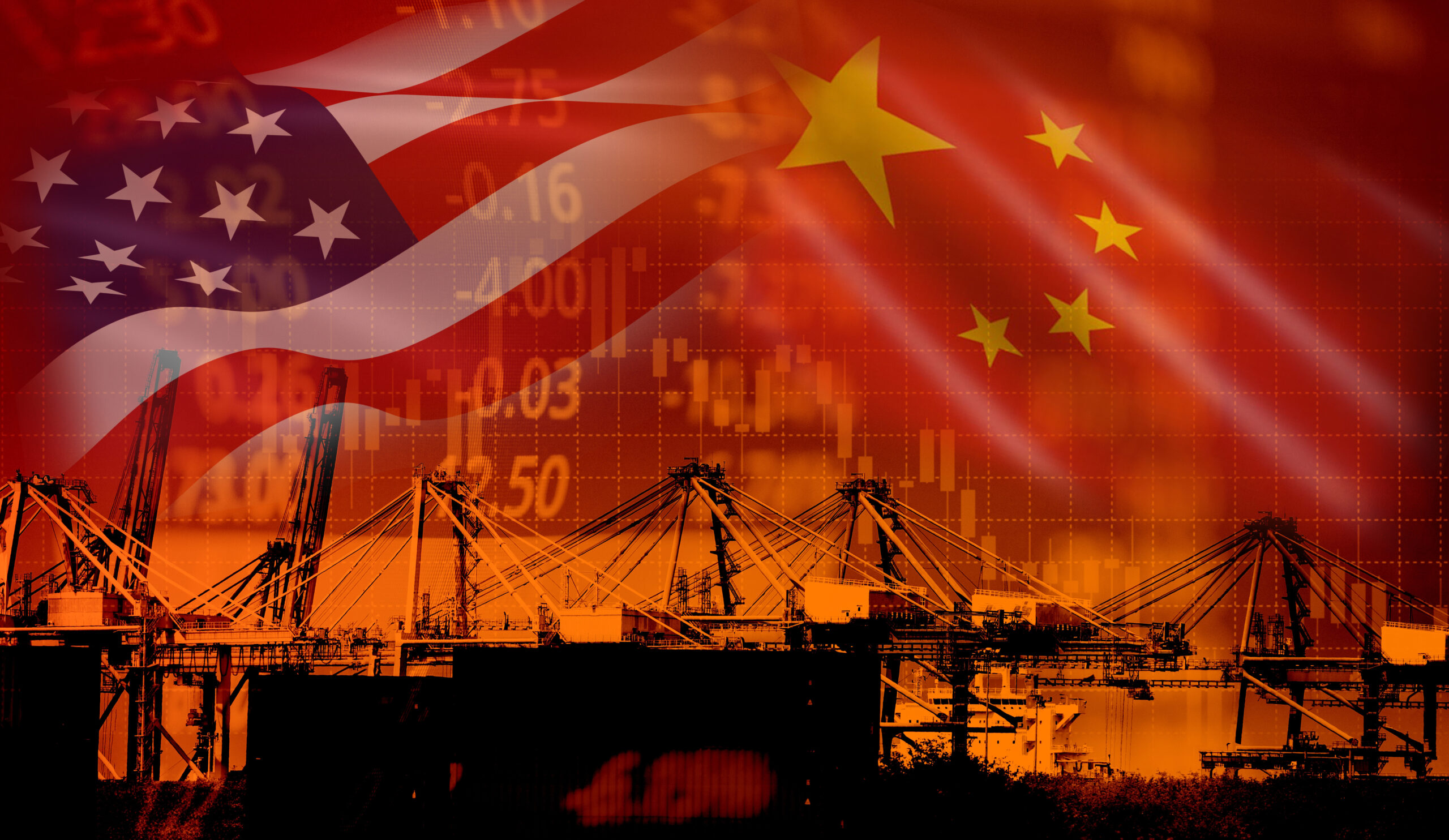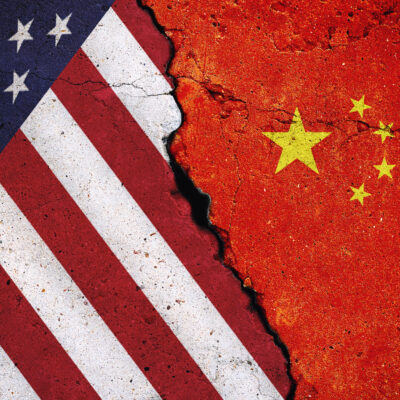

To Congressman Patrick McHenry’s credit, he is not entirely wrong about restrictions on outbound investment to China. The chairman of the House Financial Services Committee, serving presently as Speaker Pro Tempore of the House, has rightly assailed the Biden administration’s long-delayed and ill-conceived restrictions on U.S. investment in China, which do as little as possible to restrict investment. Upon announcing the rules, White House officials took pains to emphasize their “longstanding commitment to open investment,” the narrowness of the restrictions, and the permissibility of continued U.S. funding even for Chinese “AI systems designed for certain dual-use capabilities that pose national security risk.”
In a letter to Secretary of the Treasury Janet Yellen last week, McHenry warned that the proposed rules are “more about rhetoric than effectively undermining China’s military capabilities.” The government will be “unable to draw distinctions between civilian and military specifications for artificial intelligence.” The rule’s “proposal to exempt intellectual property licensing arrangements also underscores how arbitrary it is.” True, true, and true.
Unfortunately, Rep. McHenry’s goal is not reversing the Biden administration’s China follies, but rather doubling down on the weakness and carrying it to the logical conclusion: an outright embrace of subjecting America to greater influence from the Chinese Communist Party. Secretary Yellen believes “we gain and China gains from trade and investment that is as open as possible.” McHenry goes further, concluding his letter with what can only be called a “galaxy brain” argument that in fact it is the United States that can influence China by fostering cross-border investment:
If we oppose China’s state-run economy, we want more private investment – not less. Of those private investors, we want more of them to be Americans – not fewer. And if we are truly concerned by China’s technology companies, we want as many Americans as possible steering them, spreading Western standards, and complying with U.S. laws.
The Committee on Foreign Investment in the United States (CFIUS) screens inbound investments for national security threats, notes McHenry, so screening outbound investments “turns[s] the rationale for CFIUS on its head. It is China (not the U.S.) that would want to prohibit Americans’ control over Chinese firms.”
This is very wrong, but at least it is helpfully wrong in stating its faulty premises so clearly. The mistake is the assumption that the dynamics of America’s free market apply everywhere, and so for all the reasons we might worry about Chinese investment in the American economy we should celebrate American investment in the Chinese economy. Generally speaking, naïve universalism is more common on the Left, which helps to explain the Biden administration’s commitment to keeping U.S. trade and investment with China “as open as possible.” But the market fundamentalism still common on segments of the Right can share the affliction, and Rep. McHenry’s letter evinces a very bad case.
To reverse rather than compound Biden’s errors, policymakers must begin with a clear understanding of why U.S. investment in China is so concerning. The China challenge is not only, or even primarily, one of national security. It is that too, to be sure. But the fundamental problem is that America’s free market economy is incompatible with China’s state-controlled one. America must disentangle from China to protect its market from subversion by the CCP. Any serious agenda for dealing with China must advance that goal.
The Challenge of Incompatible Systems
As Gabriela Rodriguez and I argue in our American Compass paper, A Hard Break from China (also adapted as a Foreign Affairs essay), capital flows between the United States and China have an important asymmetry. PRC-based ownership of American assets—real estate and corporate equity, in particular—presents significant challenges. American ownership of assets in China does too—regardless of any direct linkages to national security. Common sense would suggest that if Americans were concerned about the CCP exercising control in the United States, they should conversely be delighted by the prospect of the United States exercising control in China. This is Rep. McHenry’s claim. But the interaction of China’s state-controlled economy and the American free market makes capital flows and the entanglement of ownership undesirable for the United States in both directions.
Americans invest in China as private individuals and firms. They use any control that they can exercise, or data and technology that they can access, to advance their private interest—generally, without consideration of their nation’s interests. They subject themselves, meanwhile, to the control of an authoritarian government that has shown no compunction manipulating foreign investors and leveraging market access to advance its national interest. Firms have typically been required to enter the country through joint ventures with PRC-based entities, and transfer technology to them. If an American investor or firm were somehow to establish sufficient control to act contrary to the CCP’s interest in China, the CCP could simply expropriate the assets. None of this is true when PRC-controlled entities make investments in the American private sector.
Jay Newman, the legendary lawyer behind Elliott Management’s bond battle with Argentina, underscores this point emphatically in a recent piece for the Financial Times:
[China’s] Foreign Relations Law is equally sweeping, and makes clear that it targets foreigners as much as Chinese nationals. “Foreigners and foreign organisations in mainland China shall comply with Chinese law and must not endanger China’s national security, harm the societal public interest, or undermine societal public order.” Taken as a whole, this legal framework is already having a chilling effect. Full and frank disclosure to investors and regulators around the world is, in effect, now illegal under Chinese law.
A few case studies help illustrate the situation.
- The Apple Example: Manipulating U.S. Investment. Rep. McHenry’s belief that more private U.S. investment challenges state control of the Chinese economy misunderstands the nature of “private” investment in China. Consider the case of Apple, the world’s most valuable corporation, which has made enormous investments in Chinese supply chains and selling to Chinese consumers. In 2016, the PRC shut down the iBooks Store and iTunes Movies just six months after their launch and issued a patent ruling that put iPhone sales in jeopardy. According to reporting by The Information, Apple faced “threats that would have hobbled the company’s devices and services, including Apple Pay, iCloud and the App Store” and “executives were scrambling to salvage the company’s relationship with Chinese officials.” CEO Tim Cook visited the country and signed “a pledge to help Chinese manufacturers develop ‘the most advanced manufacturing technologies’” and “promised to use more components from Chinese suppliers in its devices, sign deals with Chinese software firms, collaborate on technology with Chinese universities and directly invest in Chinese tech companies.” The secret agreement committed Apple to $275 billion in investment over five years, an amount that would exceed Apple’s total revenue in China over the period.
- The COMAC Example: Upgrading Chinese Technology. Rep. McHenry’s belief that Americans can “steer” Chinese technology companies misunderstands the nature of the relationships established. China uses the leverage of market access to draw investment and technology out of the United States. For instance, the state-owned Commercial Aircraft Corporation of China (COMAC) required foreign firms supplying components for its first commercial airliner, the C919, to form joint ventures with PRC-based firms and transfer advanced technology to them. To gain access to the lucrative Chinese market, General Electric agreed to form a joint venture with the state-owned Aviation Industry Corporation of China (Avic) and share its “most sophisticated airplane electronics.” Avic also produces the Chinese military’s most advanced aircraft.
- The Tesla Example: Promoting Socialism. The ultimate refutation of Rep. McHenry’s thesis that private American investors can challenge the CCP in the Chinese market comes from Elon Musk, whose Tesla Motors now reports that the majority of its stakeholders are China-based. Rather than give him leverage to bring more capitalist values to China, this relationship gave the CCP leverage to force his announcement this summer that Tesla will promote “core socialist values.”
Meaningful Outbound Investment Restrictions
The Biden administration’s policies will have little effect. Narrow targeting of investment for national security purposes will fail on its own terms, and it is the wrong target. The problem is that the PRC controls U.S. investments in China, the solution is to halt those investments.
U.S. law cannot exercise jurisdiction in China, which means that efforts to prevent American investments there must focus on constraining the investor’s actions while in the United States. The American firm or investor will always have the option of leaving and then proceeding to invest. Thus, prohibiting investment in China is best understood as forcing a choice between continuing to operate in the United States and doing business in China instead. If Elon Musk would prefer to leave the United States for China, rely on PRC-based capital markets, and subject himself and his assets to CCP control, he should be welcome to do so. What he should not be able to do is reap all the benefits of American democratic capitalism while also serving predominantly PRC-based stakeholders.
- Policy: Prohibition on Outbound Investments and Joint Ventures. American investors are already reconsidering their exposure to China given current geopolitical tensions and several proposals would create an outbound investment review mechanism, comparable to CFIUS, empowered to review and block transactions that present risk to American national security or economic resilience. But case-by-case review subject to national security criteria are poorly tailored to the challenge. Legislation should prohibit Americans and U.S.-based entities from pursuing “transactions” as defined by CFIUS that entail the acquisition of equity, debt, or real estate in China. The prohibition should extend to joint ventures formed between American and PRC-based entities for conducting business in any jurisdiction.
- Policy: Entity List Harmonization. The federal government already maintains multiple lists denoting foreign entities to which goods, services, or capital cannot be provided. However, they are dispersed across different agencies, use different criteria, and overlap only partially. At least with respect to China, legislation should consolidate these lists to a single one managed jointly by the Defense, Treasury, and Commerce Departments that imposes the restrictions on exports and investment contemplated by each.
- Policy: Intellectual Property Sanctions. The United States and its allies already operate a sanctions regime for prohibiting the transfer of military technology to certain nations, called the Wassenaar Arrangement. U.S. law should apply this same framework to all technology transfer into China. The United States should pursue comparable commitments from allies but proceed regardless of their participation.
- Policy: Exclusion of PRC-Based Entities from American Listings. U.S. law should prohibit American stock exchanges from listing PRC-based entities and prohibit index funds and mutual funds listed on American exchanges or offered via tax-exempt retirement plans or public pension plans from including the foreign listings of such entities. The American Financial Markets Integrity and Security Act of 2021, introduced by Senator Marco Rubio and five cosponsors, would have applied such exclusions to PRC-based companies on some of the entity lists mentioned above. This framework helpfully identifies the types of capital market access that should be denied, but the law should apply to all PRC-based companies rather than relying on national security-focused criteria.
Free Markets, Investing in China: Choose One
At a September hearing, Rep. McHenry remarked, “to outcompete China we cannot become more like the Chinese Communist Party. We must double down on our commitment to free people and free markets.” Encouraging American investment in China accomplishes the opposite of his stated and quite proper goal. Whereas market fundamentalism has long taken the opening and integration of global markets as the apotheosis of the “free market,” free trade and open investment advance free markets only when they occur within free markets. Integrating the America market with a state-controlled one of comparable size led by a Communist, authoritarian adversary cannot possibly advance the freedom of America’s market or people, it can only subvert them.
At a minimum, a CFIUS-like process for screening American investments in China should be table stakes for any policymaker serious about confronting the challenge. But such case-by-case screening is cumbersome and works most effectively in only the most egregious situations. Predictability, efficiency, and efficacy all favor broad, robust prohibitions as the default.
Recommended Reading
A Hard Break from China
Protecting the American Market from Subversion by the CCP
The Case for a Hard Break With China
In Foreign Affairs, Oren Cass and Gabriela Rodriguez make the case for why economic de-risking is not enough
Policy Brief: End “Permanent Normal Trade Relations” with China
Reclaiming control of U.S. trade policy












